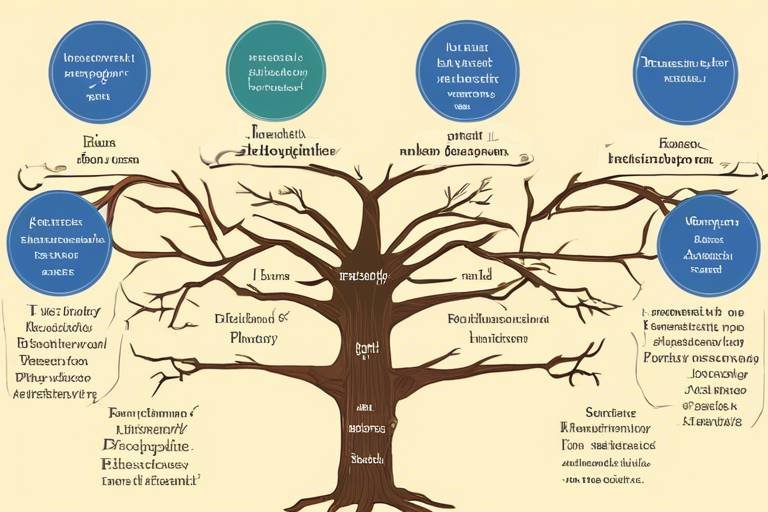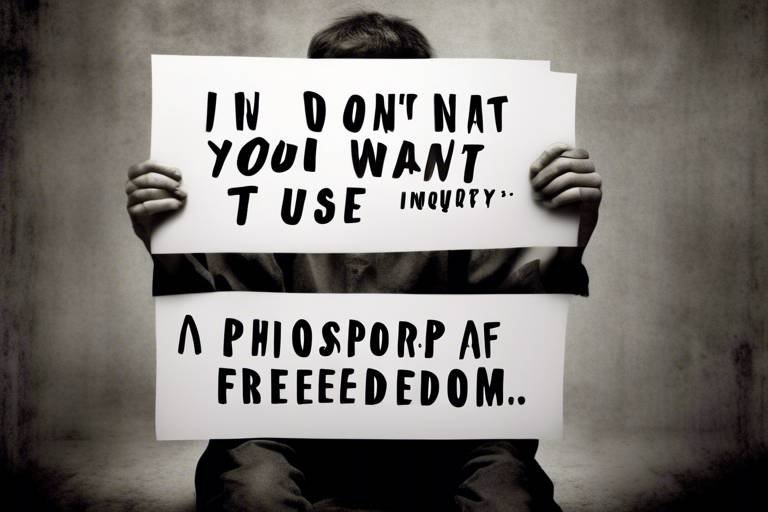Can My Life Be More Meaningful? A Philosophical Approach
Have you ever found yourself gazing out of the window, lost in thought, pondering the age-old question: Can my life be more meaningful? You're not alone! This quest for meaning is a fundamental aspect of the human experience. From the moment we become aware of our existence, we start seeking purpose, trying to make sense of our lives amidst the chaos of the world. So, what drives this desire for significance? Is it a deep-seated need for connection, a yearning for legacy, or perhaps a simple quest for happiness? In this article, we will embark on a journey through various philosophical lenses, exploring how different perspectives can illuminate our understanding of life's meaning and guide us toward a more fulfilling existence.
Understanding the human desire for meaning is fundamental. It shapes our choices, influences our relationships, and ultimately defines our existence. Think about it: every decision you make, from your career path to your personal relationships, is influenced by what you perceive as meaningful. We often find ourselves asking questions like, “What is my purpose?” or “How can I contribute to the world?” This search can sometimes feel like a treasure hunt, where the treasure is a deeper understanding of ourselves and our place in the universe. But, just like any quest, it can be filled with challenges and uncertainties. The struggle to find meaning is not just a philosophical debate; it’s a personal journey that each of us must undertake.
Different philosophical traditions offer unique insights into meaning. Let's dive into a few of these perspectives, starting with existentialism. Existentialist thinkers like Jean-Paul Sartre and Albert Camus argue that individuals create their own meaning in life. They suggest that life is inherently devoid of purpose, and it’s up to us to infuse it with significance. This perspective encourages us to embrace our freedom and authenticity, to live life on our own terms. On the flip side, we have nihilism, which posits that life lacks inherent meaning. While this might sound bleak, it challenges us to confront our beliefs and consider how we can respond to this perspective. Finally, humanism offers a refreshing affirmation of human values and experiences, emphasizing the importance of connection and community in fostering a sense of meaning.
Existentialist thinkers like Sartre and Camus argue that individuals create their own meaning. This idea is both liberating and daunting. Imagine standing at the edge of a cliff, looking out into the vast ocean of possibilities. The freedom to choose your path can be exhilarating, but it also comes with the weight of responsibility. Authenticity becomes a guiding principle in crafting a meaningful life. It’s about being true to yourself, embracing your passions, and not being afraid to carve out your own unique path. This journey of self-discovery can lead to profound insights and a richer, more fulfilling existence.
Nihilism posits that life lacks inherent meaning, which can feel like a dark cloud hovering over our aspirations. However, this perspective can serve as a catalyst for personal growth. By acknowledging the absence of predetermined significance, we are empowered to create our own meaning. It’s like standing in an empty room; you have the freedom to decorate it however you wish. Embracing nihilism doesn’t mean succumbing to despair; rather, it invites us to explore what truly matters to us and to construct a life filled with purpose on our own terms.
Humanism emphasizes human values and experiences, offering a refreshing perspective in our quest for meaning. It encourages us to look outward, to connect with others, and to foster relationships that enrich our lives. Think of it as a warm embrace in a cold world; humanism reminds us that we are not alone in our search for significance. By engaging with our communities, sharing experiences, and supporting one another, we can cultivate a profound sense of belonging and purpose. This approach underscores the importance of empathy, compassion, and shared humanity in our journey toward a meaningful existence.
Reflecting on personal experiences is vital for finding meaning. It’s through introspection that we uncover our values, beliefs, and aspirations. Consider keeping a journal, where you can document your thoughts and feelings. This practice not only fosters self-awareness but also encourages personal growth. As you navigate through life’s ups and downs, take the time to pause and reflect on your journey. What lessons have you learned? What moments have shaped your understanding of what is meaningful? Engaging in self-exploration can illuminate pathways to a more fulfilling life.
Relationships significantly impact our sense of meaning. The connections we forge with others can enhance our lives and contribute to a deeper understanding of our purpose. Think of your relationships as the threads that weave the tapestry of your life; each connection adds color and depth to your existence. Whether it’s family, friends, or even acquaintances, these interactions shape our experiences and influence our perceptions of meaning.
Fostering meaningful relationships requires effort and intention. It’s not just about being present physically; it’s about engaging emotionally and authentically. Consider reaching out to loved ones, sharing your thoughts, and being open to their perspectives. Here are a few strategies to cultivate deeper connections:
- Practice active listening: Show genuine interest in others' stories.
- Be vulnerable: Share your thoughts and feelings openly.
- Engage in shared activities: Find common interests that can strengthen your bond.
By investing time and energy into your relationships, you’ll find that they become a source of meaning and fulfillment in your life.
A sense of belonging is crucial for meaning. Being part of a community provides us with support, encouragement, and shared experiences that enrich our lives. Whether it’s joining a local club, volunteering, or participating in community events, getting involved can foster a sense of connection that enhances our understanding of purpose. Remember, we are social beings, and our interactions with others play a significant role in shaping our experiences and perceptions of meaning.
- What is the meaning of life? The meaning of life varies for each individual and can be shaped by personal experiences, beliefs, and values.
- How can I find meaning in my life? Engage in self-reflection, explore your passions, and cultivate meaningful relationships to uncover what is significant to you.
- Is it normal to question life's meaning? Absolutely! Questioning the meaning of life is a natural part of the human experience and can lead to personal growth.

The Search for Meaning
Understanding the human desire for meaning is fundamental to our existence. Have you ever found yourself pondering the big questions in life? Why are we here? What’s the purpose of it all? These questions are not just philosophical musings; they are at the core of what it means to be human. Our quest for meaning shapes our choices, influences our relationships, and ultimately defines our experiences. In a world that often feels chaotic and unpredictable, the search for meaning can serve as a guiding light, helping us navigate through life’s uncertainties.
At its essence, the desire for meaning stems from our innate need to connect with something greater than ourselves. This could be a belief system, a passion, or even relationships with others. When we feel that our lives have purpose, we tend to experience greater satisfaction and happiness. Consider the following aspects of our search for meaning:
- Personal Growth: The journey toward finding meaning often involves self-discovery and personal development. Engaging in activities that challenge us can lead to profound insights about our values and beliefs.
- Connection with Others: Relationships play a crucial role in how we perceive meaning. The bonds we create with family, friends, and communities can provide a sense of belonging and support.
- Contribution to Society: Many find meaning through acts of service. Contributing to the well-being of others can create a sense of fulfillment that transcends individual desires.
As we explore these dimensions, it's essential to recognize that the search for meaning is not a one-size-fits-all journey. Each person's path is unique, influenced by their experiences, beliefs, and aspirations. Some may find meaning in their careers, while others may discover it through creative expression, spirituality, or adventure. The key is to remain open to exploration and reflection. By doing so, we can uncover the layers of our existence that resonate with our inner selves.
Moreover, the search for meaning often leads us to confront our fears and uncertainties. It pushes us to ask tough questions and seek answers that may not always be clear. This process can be uncomfortable, but it is also incredibly rewarding. By facing our existential doubts head-on, we can emerge stronger and more resilient, equipped with a deeper understanding of ourselves and our place in the world.
In conclusion, the search for meaning is a deeply personal and transformative journey. It invites us to reflect on our values, relationships, and contributions to society. As we navigate through life's complexities, let us embrace this quest, knowing that the answers we seek may very well lead us to a more fulfilling existence.

Philosophical Perspectives
When it comes to the quest for meaning in life, various philosophical perspectives provide a rich tapestry of insights that can guide our understanding. Each school of thought offers a unique lens through which we can examine our existence, our purpose, and the choices we make. By exploring these philosophies, we can identify what resonates with us personally and how we can apply these ideas to enhance our lives. The three major perspectives we will delve into are existentialism, nihilism, and humanism. Each of these philosophies presents its own challenges and affirmations about the meaning of life, inviting us to reflect deeply on our own beliefs.
Starting with existentialism, we find that it champions the idea that life is not inherently meaningful; rather, it is up to each individual to create their own meaning. Thinkers like Jean-Paul Sartre and Albert Camus emphasize the importance of authenticity—the idea that we must live in accordance with our true selves and values. This can be likened to an artist crafting a masterpiece; the canvas of our lives is blank, and it’s up to us to paint it with our experiences, choices, and passions. Existentialists argue that by embracing our freedom and responsibility, we can forge a life that feels significant and fulfilling.
On the other end of the spectrum lies nihilism, a philosophy that asserts life is devoid of inherent meaning or value. This perspective can be quite daunting, as it challenges the very foundation of our existence. Imagine standing on the edge of a vast, empty abyss—this is the nihilistic view of life. However, rather than succumbing to despair, individuals can respond to nihilism by creating their own meaning through personal experiences and relationships. The challenge here is to find purpose in a seemingly indifferent universe, which can lead to profound personal growth and resilience.
In contrast, humanism offers a more optimistic viewpoint, emphasizing human values, experiences, and the importance of connection. Humanists believe that we can find meaning through our relationships with others and our contributions to society. This approach fosters a sense of belonging and community, which is essential for a fulfilling life. It’s like a warm embrace in a cold world; humanism encourages us to engage with others and uplift one another. By prioritizing empathy and understanding, we can create a life rich in meaning and purpose.
To summarize, these philosophical perspectives provide invaluable insights into our search for meaning. Existentialism urges us to take charge of our lives and create our own significance, nihilism challenges us to find purpose amidst the void, and humanism celebrates the connections we forge with others. By reflecting on these ideas, we can navigate our own paths toward a more meaningful existence, drawing inspiration from each philosophy while crafting a narrative that is uniquely our own.

Existentialism and Authenticity
Existentialism, a philosophical movement that emerged in the 20th century, challenges us to confront the reality that we are the architects of our own meaning. Thinkers like Jean-Paul Sartre and Albert Camus argued that life, in its essence, is devoid of predetermined purpose. This can feel daunting, like standing at the edge of a vast, uncharted ocean with no map in sight. But here’s the exhilarating part: this void allows us the freedom to create our own significance. We are not merely passengers on a predetermined journey; we are the captains of our own ships, steering through the storms and calm waters of existence.
Authenticity, a core tenet of existentialism, invites us to live in accordance with our true selves. It’s about peeling away the layers of societal expectations, much like shedding an uncomfortable coat that no longer fits. When we embrace authenticity, we can ask ourselves profound questions: What do I truly value? What brings me joy? How do I want to be remembered? These reflections are not just philosophical musings; they are essential steps toward crafting a life that resonates with our inner truths.
To truly understand authenticity, we must also recognize the importance of choice. Every decision we make, from the mundane to the monumental, shapes our identity and our experience of life. Sartre famously stated, “Existence precedes essence,” meaning that we are not born with a set purpose; rather, we define ourselves through our choices. This is both liberating and terrifying. It places the responsibility squarely on our shoulders, but it also empowers us to live a life that is genuinely ours.
In practice, embracing existentialism and authenticity can lead to profound personal growth. Here are some strategies to help you along the way:
- Self-Reflection: Regularly take time to reflect on your thoughts, feelings, and experiences. Journaling can be a powerful tool for this.
- Challenge Norms: Don’t be afraid to question societal norms and values. Are they truly yours, or have you simply accepted them?
- Set Intentions: Make conscious choices that align with your values. This could mean pursuing a career that excites you or nurturing relationships that feel genuine.
Ultimately, the journey toward authenticity is a lifelong process. It requires courage to face the unknown and the willingness to embrace the messy, unpredictable nature of life. As we navigate this journey, we may stumble, but each misstep is an opportunity for growth. By embracing existentialism, we not only find meaning in our own lives but also inspire others to embark on their own quests for authenticity.
1. What is existentialism?
Existentialism is a philosophical movement that emphasizes individual freedom, choice, and the search for meaning in a world that is often seen as meaningless.
2. How can I live authentically?
Living authentically involves understanding your true values, making conscious choices that reflect those values, and being honest with yourself and others.
3. What is the significance of choice in existentialism?
In existentialism, choice is fundamental because it shapes our identity and allows us to create our own meaning in life.
4. Can existentialism lead to despair?
While existentialism acknowledges the potential for despair due to the absence of inherent meaning, it also emphasizes the freedom and responsibility we have to create our own purpose.

Nihilism's Challenge
Nihilism, at its core, presents a profound challenge to our understanding of life and meaning. It posits that life is inherently devoid of purpose, value, or significance. Imagine standing in a vast, empty desert, with no landmarks to guide you—this is the existential landscape nihilism paints. For many, this perspective can feel overwhelming and even paralyzing. The question arises: if nothing holds intrinsic value, how do we navigate our lives? This is where the challenge intensifies.
One of the most striking implications of nihilism is its ability to strip away the comforting narratives we often cling to. For instance, traditional beliefs, whether religious or cultural, provide a framework that helps us make sense of our existence. When confronted with nihilism, these frameworks can seem fragile, leaving individuals questioning the very foundations of their lives. The existential void can lead to feelings of despair, as one grapples with the notion that life may be nothing more than a series of random events.
However, this bleak outlook doesn't have to lead to hopelessness. In fact, many find that confronting nihilism can catalyze a personal revolution. By acknowledging the absence of inherent meaning, we are liberated to create our own. It’s akin to being handed a blank canvas; the absence of pre-defined shapes allows for a unique masterpiece. This perspective invites us to become the architects of our own lives, crafting meaning through our choices, relationships, and experiences.
To navigate nihilism effectively, individuals might consider adopting the following strategies:
- Embrace Creativity: Engaging in creative pursuits can provide a sense of fulfillment and personal expression, allowing individuals to craft their own meanings.
- Seek Connection: Building relationships with others can foster a sense of belonging and shared purpose, countering the isolation that nihilism may impose.
- Practice Mindfulness: Being present in the moment can help individuals appreciate life’s experiences, even in the absence of overarching meaning.
Ultimately, nihilism challenges us to confront uncomfortable truths about existence. Yet, it also offers a unique opportunity for growth and self-discovery. By embracing the idea that we are free to create our own meaning, we can transform the nihilistic void into a canvas for our aspirations, dreams, and connections. The journey through nihilism may be daunting, but it can lead to a richer, more authentic life.
- What is nihilism? Nihilism is a philosophical belief that life lacks inherent meaning, purpose, or value.
- How can one cope with nihilistic thoughts? Engaging in creative activities, building relationships, and practicing mindfulness can help individuals cope with nihilism.
- Does nihilism mean giving up on life? Not necessarily. While nihilism challenges traditional beliefs, it can also empower individuals to create their own meaning.

Humanism's Affirmation
Humanism, at its core, is a philosophy that celebrates the intrinsic value of human beings and our shared experiences. It invites us to look beyond the constraints of dogma and to focus on what truly matters: our relationships, our aspirations, and our capacity for growth. In a world often overshadowed by chaos and uncertainty, humanism serves as a beacon of hope, affirming that we can create meaning through our actions and connections. Just think about it: when was the last time you felt truly alive? Was it during a moment of achievement, or perhaps while sharing laughter with friends? These experiences are not just fleeting; they are the threads that weave together the fabric of a meaningful life.
One of the fundamental tenets of humanism is the emphasis on **connection**. We are inherently social creatures, and our interactions with others play a pivotal role in shaping our sense of purpose. Whether it's through family, friendships, or community, these relationships nourish our spirit and provide a sense of belonging. In fact, studies have shown that strong social ties can lead to greater happiness and even longer life. So why not prioritize these connections? By investing time and energy into nurturing our relationships, we can cultivate a more profound sense of meaning in our lives.
Moreover, humanism encourages us to embrace our **shared humanity**. It reminds us that despite our differences, we all experience love, loss, joy, and sorrow. This shared experience can foster empathy and understanding, allowing us to build bridges rather than walls. Imagine a world where we all recognized our common struggles and triumphs. How much richer would our lives be if we approached each other with compassion? By acknowledging our collective journey, we can create communities that uplift and inspire one another.
In practical terms, humanism can manifest in various ways. Engaging in community service, participating in local events, or simply reaching out to a neighbor can all contribute to a sense of belonging. Here are some actions you might consider:
- Volunteer at local charities or organizations.
- Join clubs or groups that align with your interests.
- Attend community events to meet new people.
Ultimately, humanism's affirmation lies in its ability to empower individuals to take charge of their own narratives. It encourages us to ask ourselves: What do I value? What brings me joy? By reflecting on these questions, we can align our lives with our core beliefs and passions, crafting a meaningful existence that resonates with our true selves. So, let's embrace humanism as a guiding philosophy, one that champions the beauty of human connection and the potential for personal growth.
Q: What is humanism?
A: Humanism is a philosophical stance that emphasizes the value and agency of human beings, focusing on human values and experiences rather than religious doctrines.
Q: How can humanism contribute to a meaningful life?
A: By fostering connections with others, embracing shared experiences, and encouraging personal growth, humanism helps individuals create their own sense of purpose and fulfillment.
Q: What are some practical ways to incorporate humanism into daily life?
A: Engage in community service, build relationships with others, and reflect on personal values and goals to align your life with what matters most to you.

Personal Reflection and Growth
When it comes to finding meaning in life, personal reflection is like holding up a mirror to your soul. It's not just about looking at your face; it’s about diving deep into who you are, what you value, and where you want to go. Think of it as a journey through a dense forest where every path you take leads to a new realization about yourself. This self-exploration is crucial because it allows you to understand your desires and fears, paving the way for growth. Without reflection, it’s easy to get lost in the noise of everyday life, like a ship adrift at sea.
Engaging in personal reflection can take many forms. Some people find solace in journaling, while others may prefer meditation or simply taking long walks to clear their minds. The key is to create a consistent practice that resonates with you. This practice can help you uncover patterns in your thoughts and behaviors that might otherwise go unnoticed. For instance, you might discover that you often shy away from challenges due to a fear of failure. Recognizing this can be the first step toward confronting and overcoming that fear.
Moreover, personal growth is often a two-way street. It’s not just about introspection; it’s also about how you apply what you've learned. You might reflect on a past experience where you felt unfulfilled and realize that it stemmed from a lack of connection with others. This insight can motivate you to seek deeper relationships, leading to a more meaningful existence. It's like planting seeds in a garden; the more you nurture them with reflection and action, the more they will bloom.
Here are some strategies to encourage personal reflection and growth:
- Set aside time for yourself: Dedicate a few minutes each day to think about your experiences, feelings, and goals.
- Ask yourself open-ended questions: Questions like “What makes me truly happy?” or “What are my core values?” can spark insightful reflections.
- Seek feedback from others: Sometimes, those around you can offer perspectives that you might not see yourself.
- Embrace change: Growth often requires stepping out of your comfort zone, so be open to new experiences.
As you embark on this journey of reflection and growth, remember that it’s a continuous process. Life is not a destination but rather a series of evolving experiences that shape who you are. Just like a river flows and changes course over time, so too will your understanding of yourself and your purpose. Embrace the twists and turns, and you’ll find that each experience, whether joyful or challenging, adds to the richness of your life.
Ultimately, personal reflection and growth can lead to a more meaningful life. By understanding yourself better, you can make choices that align with your true values and desires. This alignment not only enhances your sense of purpose but also fosters a deeper connection with the world around you. So, take a moment to reflect, and watch how it transforms your journey.
- What is personal reflection? Personal reflection is the process of introspecting and examining one’s thoughts, feelings, and experiences to gain insight and foster growth.
- How can I start reflecting on my life? You can start by setting aside time each day to think about your experiences, journaling, or asking yourself meaningful questions.
- Why is personal growth important? Personal growth helps you understand yourself better, make informed decisions, and lead a more fulfilling and meaningful life.
- Can reflection lead to change? Absolutely! Reflection can reveal areas of your life that need improvement, motivating you to make positive changes.

The Role of Relationships
When we think about what makes life meaningful, we often overlook a crucial element: our relationships. These connections with family, friends, and even acquaintances shape our experiences and influence our emotions. Have you ever noticed how a simple conversation with a friend can turn a dull day into something special? That's the power of relationships! They are like the threads in the fabric of our lives, weaving together moments of joy, sorrow, and everything in between.
Relationships provide us with a sense of belonging, a feeling that we are part of something larger than ourselves. They can be our greatest source of support during tough times and our biggest cheerleaders during moments of triumph. Think about it: how often do you find yourself reflecting on a cherished memory, and at the center of that memory is another person? Whether it's a family gathering, a night out with friends, or a quiet moment with a partner, these connections are what make life vibrant and full of meaning.
Moreover, the quality of our relationships significantly affects our mental and emotional well-being. Research consistently shows that individuals with strong social ties experience lower levels of stress and anxiety, and they tend to live longer, healthier lives. In fact, a study published in the journal Psychological Science found that people who have meaningful relationships are not only happier but also have better physical health. It's as if our relationships act as a buffer against life's challenges, providing us with the strength to navigate through difficult times.
However, building and maintaining these meaningful connections requires effort and intention. It’s not enough to simply know people; we must actively engage with them. This can involve:
- Quality Time: Prioritizing time with loved ones, whether through regular family dinners or weekend outings with friends.
- Open Communication: Sharing thoughts and feelings openly to foster deeper understanding and trust.
- Acts of Kindness: Small gestures, like sending a text to check in or helping someone in need, can strengthen bonds.
In essence, relationships are the heartbeat of a meaningful life. They enrich our experiences, provide comfort, and challenge us to grow. As we navigate our journeys, it’s vital to remember that the connections we cultivate can profoundly impact our sense of purpose and fulfillment. So, take a moment today to reach out to someone who matters to you. You might just find that it’s the simplest acts of connection that lead to the most profound moments of meaning.
Q: How can I improve my relationships?
A: Improving relationships often starts with communication. Make an effort to reach out, listen actively, and express your feelings honestly. Regularly spending quality time together can also strengthen your bonds.
Q: What if I feel lonely despite having friends?
A: Loneliness can stem from a lack of meaningful connections. Try to engage in deeper conversations, share personal experiences, and seek out activities that foster community and connection.
Q: How do relationships contribute to a meaningful life?
A: Relationships provide emotional support, a sense of belonging, and shared experiences that enhance our overall well-being. They help us navigate life's ups and downs and give us a sense of purpose.

Building Connections
Building meaningful connections is akin to nurturing a garden; it requires patience, effort, and the right conditions to thrive. Just think about it: when we cultivate relationships, we’re not just planting seeds of interaction; we’re creating a rich tapestry of shared experiences that can profoundly enhance our lives. But how do we go about this? The first step is to embrace **authenticity**. When you show your true self, you invite others to do the same, creating a safe space for genuine connections.
Moreover, it's essential to engage in active listening. This means being fully present in conversations, not just waiting for your turn to speak. When you listen attentively, you validate the other person’s feelings and thoughts, which can deepen your bond. Imagine having a friend who truly understands you; that’s the power of connection! To foster these deeper relationships, consider the following strategies:
- Be Vulnerable: Share your thoughts and feelings openly. Vulnerability can be a bridge that connects hearts.
- Invest Time: Relationships need time to grow, just like plants need sunlight. Schedule regular catch-ups or activities with loved ones.
- Show Appreciation: A simple "thank you" or a compliment can go a long way in making someone feel valued.
In addition to these strategies, participating in group activities can also help in building connections. Whether it’s joining a local club, volunteering for a cause you care about, or even attending community events, these platforms provide opportunities to meet new people and forge bonds over shared interests. For instance, think about a cooking class where you bond over the joy of creating a delicious meal together. Such experiences can be the foundation of lasting friendships.
Ultimately, the journey of building connections is not just about quantity but quality. It’s about creating **meaningful relationships** that enrich your life and the lives of others. So, take that leap of faith, reach out, and start weaving those connections. The rewards can be incredibly fulfilling, transforming your life into a vibrant tapestry of relationships.
Q1: How can I start building connections with new people?
A1: Begin by engaging in activities that interest you. Join clubs or groups where you can meet like-minded individuals, and don’t hesitate to strike up conversations. Authenticity and openness are key!
Q2: What if I struggle with social anxiety?
A2: It's completely normal to feel anxious in social situations. Start small by practicing in low-pressure environments, like chatting with a cashier or a neighbor. Gradually, you can build your confidence in larger settings.
Q3: How important is vulnerability in building connections?
A3: Vulnerability is crucial! Sharing your true self encourages others to open up, creating a deeper bond. It shows that you trust them, which can strengthen the relationship.

Community and Belonging
When we think about what makes life meaningful, the concept of community often stands out as a beacon of hope and connection. After all, humans are inherently social creatures, and our relationships with others play a pivotal role in shaping our experiences and perceptions of life. The feeling of belonging to a community can provide a profound sense of purpose. It’s like being part of a tapestry; each thread is unique, yet together they create a beautiful and intricate design. Have you ever felt that rush of warmth when you’re surrounded by people who understand and support you? That’s the magic of community!
Belonging goes beyond mere social interactions; it taps into our deepest psychological needs. According to psychologist Abraham Maslow, the need for love and belonging is a fundamental human requirement, sitting right up there alongside safety and physiological needs. Without a sense of belonging, we may feel isolated and disconnected, leading to feelings of emptiness. Just imagine trying to navigate a vast ocean without a compass; that’s what it feels like to lack community! So, how do we foster this sense of belonging in our lives?
Building a strong community requires intentional effort. Here are a few strategies that can help:
- Engage in Local Activities: Participate in community events or volunteer for local organizations. This not only helps others but also allows you to meet like-minded individuals.
- Join Clubs or Groups: Whether it’s a book club, sports team, or hobby group, joining a club can help you connect with others who share your interests.
- Be Open and Approachable: Sometimes, all it takes is a smile or a friendly conversation to break the ice and form new connections.
Moreover, the digital age has transformed how we build communities. Online platforms allow us to connect with people across the globe, creating virtual communities where we can share experiences, ideas, and support. However, while online connections can be enriching, they should not replace face-to-face interactions. The tactile experience of being present with others is irreplaceable and often deepens our sense of belonging.
Community involvement can also enhance our understanding of different perspectives. Engaging with diverse groups exposes us to various cultures, beliefs, and experiences, broadening our horizons and enriching our lives. It’s like adding vibrant colors to a canvas; each interaction adds depth and richness to our understanding of the world.
Ultimately, belonging to a community is not just about being part of a group; it’s about feeling valued and understood. When we feel that we belong, we are more likely to contribute positively, fostering an environment where everyone can thrive. So, let’s embrace the power of community and cultivate those connections that make our lives not only meaningful but also truly fulfilling!
- What is the importance of community in our lives?
Community provides support, fosters relationships, and enhances our sense of belonging, which is crucial for our emotional and psychological well-being. - How can I find a community that resonates with me?
Look for local events, clubs, or online groups that align with your interests. Engaging in activities you enjoy can lead you to like-minded individuals. - Can online communities be as meaningful as in-person ones?
Yes, online communities can provide valuable connections, but they should complement, not replace, in-person interactions for a well-rounded sense of belonging.
Frequently Asked Questions
- What is the main quest for meaning in life?
The quest for meaning in life is a deeply personal journey that many of us undertake. It involves seeking a purpose that resonates with our values, experiences, and aspirations. This search is fundamental to human existence, influencing our decisions, relationships, and overall happiness.
- How do different philosophical perspectives contribute to our understanding of meaning?
Philosophical perspectives like existentialism, nihilism, and humanism offer varied insights into life's significance. Existentialism encourages individuals to create their own meaning, while nihilism challenges the existence of inherent meaning. On the other hand, humanism emphasizes human values and connections, suggesting that meaning can be found through relationships and community.
- What role do relationships play in finding meaning?
Relationships are crucial in our search for meaning. They provide support, understanding, and a sense of belonging. Engaging deeply with others can enhance our lives and help us uncover our purpose, making our journey richer and more fulfilling.
- How can I cultivate more meaningful connections with others?
Cultivating meaningful connections requires intentionality. Start by being present and actively listening to others. Share your thoughts and feelings openly, and seek opportunities to engage in shared experiences. Building trust and showing appreciation can also strengthen these bonds.
- Why is community involvement important for finding meaning?
Community involvement fosters a sense of belonging, which is vital for our overall well-being. By participating in community activities, we create shared experiences that enrich our lives and help us connect with others on a deeper level. This sense of belonging can significantly enhance our search for meaning.



















